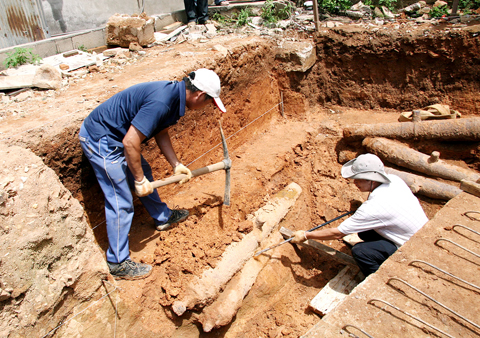Another ancient cannon was unearthed at a construction site on Kinmen Island on Saturday, bringing to 29 the number of cannons found in a weapons cache that may date back to the 17th century.
Chen Wei-chun (陳維鈞), an associate researcher at Academia Sinica’s Institute of History and Philology who took over responsibility for the excavation on Wednesday, said the cannons were a valuable cultural asset even if their age has yet to be determined.
“It is the largest number of cannons ever discovered at a single site,” said Chen, referring to the construction site in Chincheng Township (金城).

PHOTO: CNA
“The largest number of ancient cannons ever found at one site to date is 20, in Fujian Province in southern China,” Chen said.
Huang Yi-nong (黃一農), a historian and member of Academia Sinica, said after inspecting the cannons that they were similar to Western-style muzzle-loaded smoothbore cannons from the 17th century.
Ancient cannons normally bear inscriptions of who manufactured them and when they were produced, but the newly uncovered cannons are so eroded that no inscriptions could be found, leaving academics uncertain about their age.
Chen said he was seeking assistance from German scientists who have developed a technology to date the age of metal.
“If we can determine how old these cannons are, it will help us understand their historical significance,” he said.
The first cannon to be discovered was excavated by construction workers on May 5, which led to the discovery of the other 28.
The developer has turned the cannons, which vary in length from 0.9m to 1.2m and have calibers ranging from 10cm to 15cm, over to local authorities.
A local cultural official said they were similar to weapons found in other places on the island that date back to the mid-17th century.
Kinmen was occupied at the time by a warlord loyal to the dethroned Ming Dynasty. He used the island as a base to fight unsuccessfully against the Qing Dynasty from 1644 to 1670.

A strong continental cold air mass is to bring pollutants to Taiwan from tomorrow, the Ministry of Environment said today, as it issued an “orange” air quality alert for most of the country. All of Taiwan except for Hualien and Taitung counties is to be under an “orange” air quality alert tomorrow, indicating air quality that is unhealthy for sensitive groups. In China, areas from Shandong to Shanghai have been enveloped in haze since Saturday, the ministry said in a news release. Yesterday, hourly concentrations of PM2.5 in these areas ranged from 65 to 160 micrograms per cubic meter (mg/m³), and pollutants were

Taiwan’s armed forces have established response protocols for a wide range of sudden contingencies, including the “Wan Chun Plan” to protect the head of state, the Ministry of Defense (MND) said today. After US President Donald Trump on Saturday launched a series of airstrikes in Venezuela and kidnapped Venezuelan President Nicolas Maduro, concerns have been raised as to whether China would launch a similar “decapitation strike” on Taiwan. The armed forces regularly coordinate with relevant agencies and practice drills to ensure preparedness for a wide range of scenarios, Vice Minister of National Defense Hsu Szu-chien (徐斯儉) told reporters before a

EVA Airways on Saturday said that it had suspended a pilot and opened an investigation after he allegedly lost his temper and punched the first officer several times as their plane was taxiing before takeoff at Los Angeles International Airport. According to a report published on Thursday by The Reporter, the incident occurred after the flight’s Malaysian first officer tried to warn the Taiwanese pilot, surnamed Wen (文), that he was taxiing faster than the speed limit of 30 knots (55.6kph). After alerting the pilot several times without response, the first officer manually applied the brakes in accordance with standard operating

Japanese Councilor Hei Seki (石平) on Wednesday said that he plans to visit Taiwan, saying that would “prove that Taiwan is an independent country and does not belong to China.” Seki, a member of the Japan Innovation Party, was born in Chengdu in China’s Sichuan Province and became a naturalized Japanese in 2007. He was elected to the House of Concilors last year. His views on the Chinese Communist Party (CCP) — espoused in a series of books on politics and history — prompted Beijing to sanction him, including barring Seki from traveling to China. Seki wrote on X that he intends